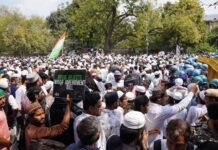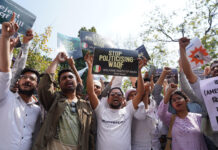Denmark is the latest in a series of European countries to enforce the so-called “burqa ban,” resulting in hundreds of demonstrators protesting against the law in Copenhagan.
Women found wearing the burqa in public can be fined 1000 Kroner (£120) on their first offence, with repeat offences risking fines of up to 10,000 Kroner, or a 2 year prison sentence.
Police also have the power to instruct women wearing the veil to remove it and go home.
Fortis Filippou, Amnesty International’s deputy director for Europe, said “the law criminalises women for their choice of clothing, making a mockery of the freedoms Denmark purports to uphold.”
Despite the harsh sanctions, a study by the University of Copenhagen found that only between 150-200 Muslim women in Denmark actually wear the niqab daily, making up a miniscule 0.1% of the total Danish population of 5.7 million.
Danish Muslim niqabi Sabina, 21, is one of these women and has described implications of the ban.
“Every time I step out of my front door I’m actually a criminal, and every time I step out of my front door I’m at risk of the police arresting me or the police giving me a fine,“ she is reported as saying. “This is going to have huge consequences for my every day life’’. She added: “I refuse to become a victim and I refuse to take my niqab off, and I believe that it’s very important that we still stick to who we are and our beliefs and we try to stand in the face of this oppression which is forced upon us.”
Subscribe to our newsletter and stay updated on the latest news and updates from around the Muslim world!
Muslims and non-Muslims have shown their opposition to the ban, with protestors gathering in Norrebo – a multicultural neighbourhood – and then marching to Bellahoej Police Station, where they formed a human chain. As they marched through the streets towards the station they chanted: “No racists in our streets.”
Many see the government move as dangerous and an infringement of the rights of women, such as Sasha Anderson who helped coordinate the demonstration. She claims that the ban is a “discriminatory” measure against a minority group and opposition to it has to be shown.
However, Martin Henriksen, an MP belonging to the Danish People’s Party – the party which originally proposed the ban – said that “the burqa and niqab are the purest form of extremism. This is a battle again fundamentalism. As a society, we are showing what we are willing to accept’’. Expressing his support for the ban, he added: “We believe this is an important step for our country and we hope it will inspire other countries to do the same. It is irreconcilable with Danish culture and values.“
He also hopes to take the ban a step further by banning Islamic headscarves from schools, as has already been done in France.






















